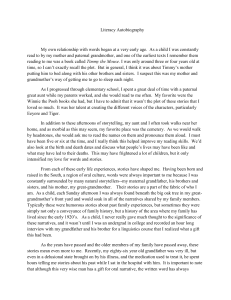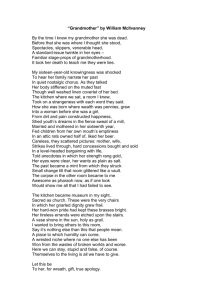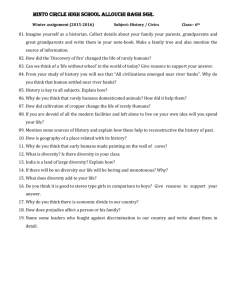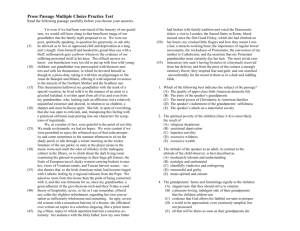Reading Comprehension Prose Passage #5
advertisement
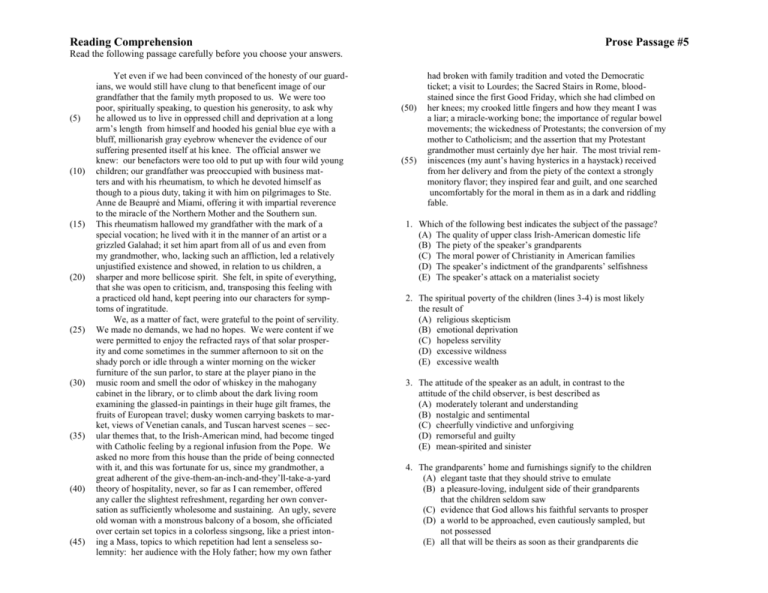
Reading Comprehension Prose Passage #5 Read the following passage carefully before you choose your answers. (5) (10) (15) (20) (25) (30) (35) (40) (45) Yet even if we had been convinced of the honesty of our guardians, we would still have clung to that beneficent image of our grandfather that the family myth proposed to us. We were too poor, spiritually speaking, to question his generosity, to ask why he allowed us to live in oppressed chill and deprivation at a long arm’s length from himself and hooded his genial blue eye with a bluff, millionarish gray eyebrow whenever the evidence of our suffering presented itself at his knee. The official answer we knew: our benefactors were too old to put up with four wild young children; our grandfather was preoccupied with business matters and with his rheumatism, to which he devoted himself as though to a pious duty, taking it with him on pilgrimages to Ste. Anne de Beaupré and Miami, offering it with impartial reverence to the miracle of the Northern Mother and the Southern sun. This rheumatism hallowed my grandfather with the mark of a special vocation; he lived with it in the manner of an artist or a grizzled Galahad; it set him apart from all of us and even from my grandmother, who, lacking such an affliction, led a relatively unjustified existence and showed, in relation to us children, a sharper and more bellicose spirit. She felt, in spite of everything, that she was open to criticism, and, transposing this feeling with a practiced old hand, kept peering into our characters for symptoms of ingratitude. We, as a matter of fact, were grateful to the point of servility. We made no demands, we had no hopes. We were content if we were permitted to enjoy the refracted rays of that solar prosperity and come sometimes in the summer afternoon to sit on the shady porch or idle through a winter morning on the wicker furniture of the sun parlor, to stare at the player piano in the music room and smell the odor of whiskey in the mahogany cabinet in the library, or to climb about the dark living room examining the glassed-in paintings in their huge gilt frames, the fruits of European travel; dusky women carrying baskets to market, views of Venetian canals, and Tuscan harvest scenes – secular themes that, to the Irish-American mind, had become tinged with Catholic feeling by a regional infusion from the Pope. We asked no more from this house than the pride of being connected with it, and this was fortunate for us, since my grandmother, a great adherent of the give-them-an-inch-and-they’ll-take-a-yard theory of hospitality, never, so far as I can remember, offered any caller the slightest refreshment, regarding her own conversation as sufficiently wholesome and sustaining. An ugly, severe old woman with a monstrous balcony of a bosom, she officiated over certain set topics in a colorless singsong, like a priest intoning a Mass, topics to which repetition had lent a senseless solemnity: her audience with the Holy father; how my own father (50) (55) had broken with family tradition and voted the Democratic ticket; a visit to Lourdes; the Sacred Stairs in Rome, bloodstained since the first Good Friday, which she had climbed on her knees; my crooked little fingers and how they meant I was a liar; a miracle-working bone; the importance of regular bowel movements; the wickedness of Protestants; the conversion of my mother to Catholicism; and the assertion that my Protestant grandmother must certainly dye her hair. The most trivial reminiscences (my aunt’s having hysterics in a haystack) received from her delivery and from the piety of the context a strongly monitory flavor; they inspired fear and guilt, and one searched uncomfortably for the moral in them as in a dark and riddling fable. 1. Which of the following best indicates the subject of the passage? (A) The quality of upper class Irish-American domestic life (B) The piety of the speaker’s grandparents (C) The moral power of Christianity in American families (D) The speaker’s indictment of the grandparents’ selfishness (E) The speaker’s attack on a materialist society 2. The spiritual poverty of the children (lines 3-4) is most likely the result of (A) religious skepticism (B) emotional deprivation (C) hopeless servility (D) excessive wildness (E) excessive wealth 3. The attitude of the speaker as an adult, in contrast to the attitude of the child observer, is best described as (A) moderately tolerant and understanding (B) nostalgic and sentimental (C) cheerfully vindictive and unforgiving (D) remorseful and guilty (E) mean-spirited and sinister 4. The grandparents’ home and furnishings signify to the children (A) elegant taste that they should strive to emulate (B) a pleasure-loving, indulgent side of their grandparents that the children seldom saw (C) evidence that God allows his faithful servants to prosper (D) a world to be approached, even cautiously sampled, but not possessed (E) all that will be theirs as soon as their grandparents die 5. Which of the following best describes the grandfather? (A) Cruel (B) Conservative (C) Deceitful (D) Long-suffering (E) Self-absorbed 10. The passage presents an ironic juxtaposition of (A) the grandfather and the grandmother (B) virtue and youth (C) innocence and egotism (D) wealth and poverty (E) Catholicism and Protestantism 6. The chief effect of such contrasts as “business matters and . . . rheumatism” (lines 10-11) and “Ste. Anne De Beaupré and Miami” (lines 12-13) is to (A) intensify the speaker’s sense of the ridiculous (B) reveal the speaker’s ambivalent attitude (C) emphasize the cynicism of the grandparents (D) reduce the grandparents to the level of low comic characters (E) glamorize the grandparents as worldly sophisticates 11. Which of the following best sums up the contrast between the attitude of the adult speaker and the attitude of the the observing child? (A) Accusatory. .awed (B) Romantic..realistic (C) Religious..secular (D) Guilty..innocent (E) Tranquil..anxious 7. The comparison of the grandfather to Galahad (line 17) is ironic primarily because the grandfather? (A) is old and ailing (B) has less pure ideals, less noble pursuits (C) recognizes no master but wealth (D) seeks little in his travels, receives no rewards at home (E) is more like a king than a knight 8. All of the following help sustain a pattern of religious imagery in the passage EXCEPT (A) “pilgrimages (lines 12) (B) “Hallowed” (line 15 (C) “vocation” (line 16) (D) “officiated” (line 43) (E) “reminiscences” (line 54-55) 9. Which of the following is the most credible reason for the kind of attention the grandmother paid to the grandchildren? (A) She had no purpose in life: she “led a relatively unjustified existence” (lines 18-19) (B) She had been mistreated so that she had a “sharper and more bellicose spirit” (line 20) (C) She had feelings of inadequacy: “She felt. . . that she was open to criticism (lines 20-21) (D) She was embarrassed by her appearance: she was an “ugly, severe old woman” (lines 42-43) (E) She was concerned about the state of their souls: her reminiscences “inspired fear and guilt” (line 57) 12. Which of the following do the children bring to their examination of the “glassed-in paintings in their huge gilt frames” (line 32)? (A) The assurance that they are civilized Christians because of the association of Italian culture with Catholicism (B) A sensitivity to the vision of great artists (C) An awareness that appearances, like gilt frames, count for little (D) The belief that Italian art is inherently religious (E) The knowledge that life in their grandparents’ home will always be as static as the figures in the paintings 13. The speaker’s attitude toward the grandparents is one of (A) bitterness tempered by maturity (B) respect strengthened by distance (C) servility imparted by discipline (D) perplexity compounded by resentment (E) gratitude made richer by love 14. The grandmother’s regard for her own conversation as “sufficiently wholesome and sustaining” (line 42) is evidence of her (A) smugness and inhospitality (B) religious prejudice (C) faith in other people (D) skill as a teacher (E) ironic sense of humor 15. The principal device used by the speaker to satirize the grandmother’s conversation (lines 46-54) is (A) mingling the serious and the trivial indiscriminately (B) including both religious and political views (C) using repetition to emphasize similar characteristics (D) introducing it with a description of the grandmother’s hospitality (E) cataloging a number of religious beliefs

